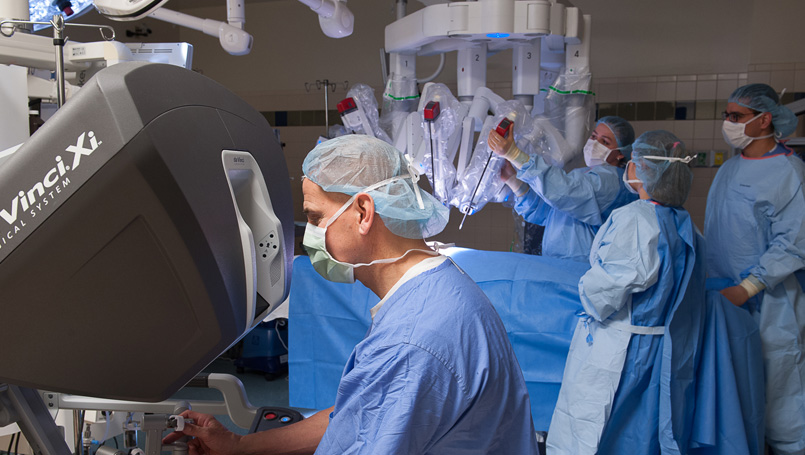
Having a medical condition that requires surgery can be stressful. You might find yourself having to make decisions about when you will have the procedure, which surgeon you will choose to do it and at what facility.
You might also be thinking about your recovery. How long will it take for you to get back to day-to-day activities and how much pain will you be in?
Often times, those details are determined by the type of surgery you have. Surgery is usually done one of three ways:
- open through a large incision
- laparoscopically using several small incisions
- robotically, which also uses small incisions to allow the surgeon to navigate several robotic arms during the procedure
Learn more about what you can expect from each type of procedure:
OPEN SURGERY
As the name implies, open surgical procedures are done through a large, open cut in the skin. While this can be done safely and effectively, the larger incision can cause:
- longer hospital stays
- longer recovery
- more pain
- larger scars
- higher risks of complications such as bleeding and infection
Beaumont Hospital, Trenton surgeon Zachary Lewis, D.O., said each patient and surgery is unique, and there are times when an open procedure is a safer, more effective approach.
“Minimally invasive surgery requires a general anesthetic, while some open procedures can be performed with local anesthesia and sedation,” says Dr. Lewis. “Many minimally invasive procedures also take longer to perform and if a patient is not healthy enough to be under anesthesia for that long, then an open approach might be better.”
LAPAROSCOPIC / ENDOSCOPIC SURGERY
Laparoscopic, or endoscopic, surgery is a minimally invasive procedure that uses several small cuts in the skin to access the surgical area. The doctor uses a tiny camera to view the area and small tools to perform the surgery. Benefits of a minimally invasive procedure include:
- smaller incisions and scars
- shorter hospital stays and recovery times
- lower risk of complications
- less pain and discomfort
Dr. Lewis said laparoscopic procedures are often done if the surgery requires more than one small incision, or port, during the surgery.
ROBOTIC SURGERY
Robotic-assisted surgery is also a type of minimally invasive procedure that uses small incisions. The difference is instead of the surgeon using their hands to manually control the camera and tools, they use the power and precision of a high tech robot.

The surgeon sits at a console and uses controls to maneuver robotic “arms” during the procedure, allowing for more precise movements. High definition 3-D imaging also allows for a better view of the operation.
Robotic surgery procedures have the same benefits as laparoscopic surgery for the patient. It’s often used in small, difficult to navigate areas of the body such as the head and neck, or for gynecologic and urologic surgeries like hysterectomies and prostate cancer treatments.
Many traditionally open surgeries are now being done robotically, gallbladder removal, hysterectomies, prostate surgery and colorectal surgery.
WHAT TYPE OF SURGERY IS RIGHT FOR ME?
While each of these types of surgery has its benefits, it’s important to discuss your options with your doctor to decide what surgery is right for you.
“Each case has to be individualized,” says Dr. Lewis. “There are some situations where a minimally invasive approach might not be feasible, and an open procedure will likely have a better outcome for the patient.”
